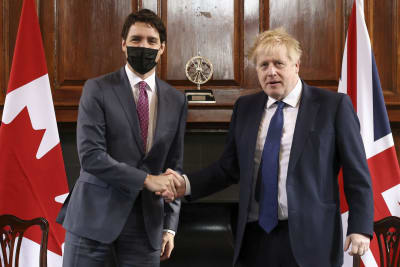By Ben Kerrigan-
Prime Minister Boris Johnson has said the Economic Crime Bill will let British authorities ”pursue (Russian President Vladimir) Putin’s allies in the U.K. with the full backing of the law, beyond doubt or legal challenge.”
The legislation was intended to be introduced after the next Queen’s Speech, but has been fast-tracked after the invasion of Ukraine cast new light on the ability of Russian oligarchs to store their wealth in Britain.
Johnson made the announcement at a meeting with Canadian Prime Minister Justin Trudeau and Dutch leader Mark Rutte on Monday to discuss toughening the West’s response to the invasion.
Labour MP Liam Byrne and the Conservative MP David Davis tabled two amendments to the economic crime bill, which will be put to a first vote on Monday.
In a joint statement on the amendments, they said: “We’re determined to build a cross-party coalition to ensure the reforms before parliament, designed to expunge from London the problem of dirty money, ensure that oligarchs of any nation can no longer use the English legal system against ordinary citizens, journalists and civil servants to silence free speech.”
Johnson claims that Britain is leading international efforts to punish Putin over the invasion of Ukraine. The U.K. has slapped sanctions on a host of Russian banks and businesses, measures the government says have curtailed more than 250 billion pounds’ ($330 million) worth of Russian economic activity. So far, though, it has sanctioned only a handful of Kremlin-linked individuals with assets in Britain, fewer than either the European Union or the U.S.
The first amendment would require the government to institute an inquiry into so-called Slapp (strategic litigation against public participation) cases intended to intimidate journalists and campaigners.
The second would protect an individual disclosing otherwise confidential information from the offshore property register, if they could show the disclosure was in the public interest.
The economic crime bill which will create a register of individuals owning UK property through offshore companies and other secrecy devices. The purpose of the register is to make it harder for criminal elements and corrupt foreign officials to launder money through London’s property sector.
During a parliamentary debate on Russian sanctions on Tuesday, MPs accused three solicitors, Geraldine Proudler of CMS, Nigel Tait of Carter-Ruck and John Kelly of Harbottle & Lewis, of deliberately filing oppressive legal actions against an investigative journalist in an attempt to intimidate her. Similar allegations were also made against the barrister Hugh Tomlinson QC.
In the Commons, Priti Patel, the home secretary, is opening the debate on the economic crime bill.
Rushed
The UK prime minister announced that the bill would be rushed through Parliament on Monday.
The bill will require overseas firms with assets in Britain to reveal their true owners, an attempt to crack down on money-laundering and the use of shadowy shell companies to buy businesses and properties.
Critics and anti-corruption campaigners have accused Conservatives of allowing ill-gotten money to slosh into U.K. properties, banks and businesses for years, turning London into a “laundromat” for dirty cash.
Initially, the legislation gave businesses 18 months to comply. That has been shortened to six months — but critics say it should be even shorter. Labour Party business spokesman Jonathan Reynolds said the grace period amounted to a “get out of London free card” for oligarchs.
The UK government has been seizing the properties of oligarchs in Britain, as part of its broad sanctions against Russia for its unlawful invasion of Ukraine.
The government says the new law will also make it easier to slap sanctions on people and firms who have already been sanctioned by allies including the U.S., Canada and the EU. Critics say the current rules involve too much legal red tape that can be used to forestall sanctions.
Britain’s Conservatives, in power since 2010, pride themselves on making the U.K. an attractive place for the world’s wealthy to live and invest. Many of the ultra-rich own London mansions, send their children to English private schools and employ fleets of PR consultants and lawyers to tend their reputations — helped by Britain’s claimant-friendly libel laws.
The anti-corruption group Transparency International says Russians linked to the Kremlin or accused of corruption own 1.5 billion pounds’ ($2 billion) worth of London property.
In a damning 2020 report whose release was delayed for months by the government, Parliament’s Intelligence and Security Committee said that since the 1990s Britain has “welcomed Russian money, and few questions — if any — were asked about the provenance of this considerable wealth.”
“There are a lot of Russians with very close links to Putin who are well integrated into the U.K. business and social scene, and accepted because of their wealth,” the report said.
Transparency campaigners have revealed that the governing Conservatives have received 2 million pounds ($2.7 million) in donations from people linked to Russia since Johnson became prime minister in 2019. The party says all its donors are registered U.K. electors, as the law demands.
Opposition politicians are demanding to know why Johnson gave a noble title and a seat in Parliament’s House of Lords to Evgeny Lebedev, the Russia-born owner of two British newspapers. His oligarch father Alexander Lebedev is a former KGB agent, and the Sunday Times newspaper reported that British intelligence agencies had expressed concerns about the 2020 appointment.
Questions will continue to be asked, but the prime minister is determined to make life difficult for the Kremlin for its violation of international laws.




